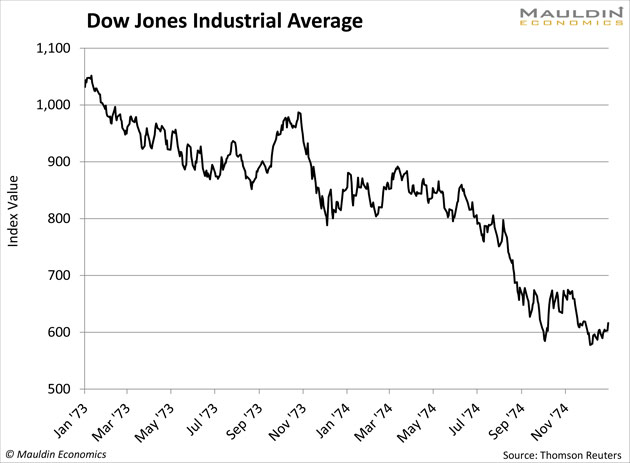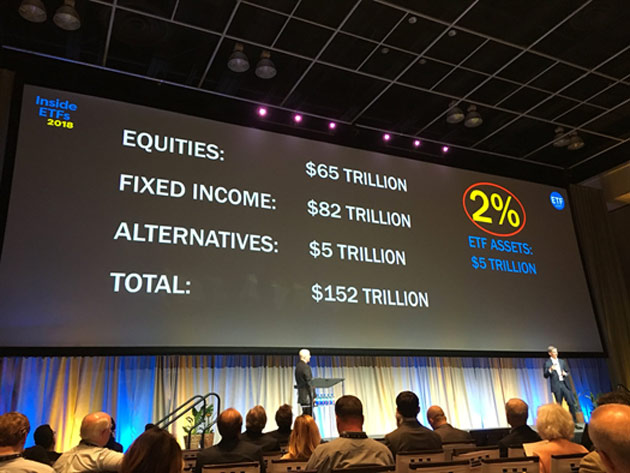| -- | January 25, 2018 The Nifty 500  There was a big bull market in the early 1970s, led by a group of fifty large cap stocks known as… drum roll… the “Nifty Fifty.” There is actually a Wikipedia entry for the old Nifty Fifty—click on it and you will see that while a lot of these companies are gonzo, the rest of them very much resemble today’s Dow. Of course, I was not around to remember the Nifty Fifty—I was born in 1974, truly a child of the bear market. Stocks were down 45%. There is also a Wikipedia page for that bear market—they even call it a “crash.” The two, of course, are related. A bubble, accompanied by an obsession or a preoccupation with a stock or group of stocks, followed by a great big dirtnap.  You look around today and wonder, is there anything like a Nifty Fifty? Well, there is FANG, but FANG is only four stocks. Besides, I don’t get the impression that any of those stocks on their own has anything like a cultish following. And it’s not like people are bananas about tech stocks, or energy stocks, or homebuilders. People aren’t really bananas about stocks. People are bananas about the stock market. | Are you interested in -
Gaining insight into today’s most important investment trends? -
Networking with some of the world’s top money managers and economists?
Reserve your seat SIC 2018 now! |
Yes, We’re Beating up Indexing Again Indexing, which was a curiosity in the 1980s, has become a religion. You invest in an S&P 500 index fund. Why? So you are diversified. You own 500 stocks, which is the ultimate in diversification. Except—you are not diversified when 30 million people own the same 500 stocks as you, because what happens if everyone wants to sell their 500 stocks all at once? It actually is a bit like the Nifty Fifty—it’s just the Nifty 500! “Is it different this time?” you ask the veteran of two ridiculously horrible bear markets. Well, you always have to entertain the idea that it could be. After all, indexation only makes up a small percentage of total investable assets. And it continues to grow, partly because its growth is encouraged by regulatory changes like the Fiduciary Rule. So there is a lot of momentum. But you have look at all these inflows into indexes, and ask what would happen if the flows went the opposite direction and they turned into redemptions. Vanguard gets $2 billion in new investor money a day. What if it lost $2 billion a day? Not saying it will happen, just being the “what if” guy. There is no trend in finance that is not capable of running in both directions. Protection How do you protect yourself? I mean, the S&P 500 makes up most of the investable market cap. You could do small cap or mid cap, but there are indices for those, too. In fact, there are way more indices than stocks, so it’s hard to find a stock that is not in an index. But it can be done. One of the things I focus on is not getting inside too many crowded theaters with tiny exits. If you are an institutional trader for any length of time, you learn to be paranoid like this. You are constantly asking the question, “How am I going to get screwed?” Nobody trades stocks these days—they trade index mutual funds and ETFs. So you do the best you can to stay away from big, popular indices. There actually are a handful of stocks, about 100 or so, that are not in any index. I did some work on this about a year ago. These stocks will not participate in the Nifty 500 on the way up… …but then again, they won’t participate in the Nifty 500 on the way down. If I were a research analyst at a large hedge fund with some time to kill, I would go through every stock in the Wilshire universe. I’d figure out how many indices it is in, and the AUM that tracks those indices. Then zig, while everyone else zags. The Bullish Argument Is Most Compelling on the Highs Unfortunately, I did not make the Inside ETFs conference this year, but I spied a photo from the conference on Twitter: 
Source: @ckelly1980 The slide is making the point that ETFs only make up 2% of investable assets, a figure that will certainly grow. And it will probably continue to grow for some time, because the ETF structure has some clear advantages over the open-end mutual fund. Remember, I’m the “what if” or “yeah, but” guy. I’m just observing that people are more bullish on indexing than at any point in history, concurrently with some other sentiment and technical indicators that are unbelievably stretched. If the bull market is because of indexing, a bear market will probably be because of an unwind of indexing. Assuming you view the market as a supply-demand equation, the only way you dump supply on the market is if you get index fund redemptions. And how does that happen? Beats the hell out of me. (Almost) Final Call If you’re planning on going to the 2018 Strategic Investment Conference, now is the time to get your ticket. Last year was terrific (Matt Ridley was a personal favorite) and SIC 2018 will be too. If you can make some time to come to San Diego for the conference, it really is worth it. The thing about SIC is, it’s a big conference, but small enough that you can have face-time with the speakers. Even a few minutes talking with someone like Louis Gave or Mark Yusko or John Mauldin is probably worth the conference fee. Also, I will be part of an ETF panel, and moderating another one on cryptocurrencies (featuring hedge fund manager John Burbank). And I’ll be interviewed on stage, and I’ll be DJing. You should come. All the details about the speakers and agenda are right here. 
Jared Dillian
Editor, The 10th Man
 | Get Thought-Provoking Contrarian Insights from Jared Dillian
Meet Jared Dillian, former Wall Street trader, fearless contrarian, and maybe the most original investment analyst and writer today. His weekly newsletter, The 10th Man, will not just make you a better investor—it's also truly addictive. Get it free in your inbox every Thursday. |
Jared's premium investment service, Street Freak, is available now. Click here for our introductory offer. Jared Dillian, former head of ETF Trading at one of the biggest Wall Street firms and author of the highly acclaimed books, Street Freak: Money and Madness at Lehman Brothers , and All the Evil of This World , shows you how to pick and trade trends, and master your inner instincts. Learn how to use “Angry Analytics” as a leading indicator of budding trends you can profit from… and how to view any market situation through the lens of a trader. Jared’s keen insight into market psychology combined with an edgy, provocative voice make Street Freak an investment advisory like no other. Follow Jared on Twitter at @dailydirtnap. Share Your Thoughts on This Article
 http://www.mauldineconomics.com/members
Use of this content, the Mauldin Economics website, and related sites and applications is provided under the Mauldin Economics Terms & Conditions of Use. Unauthorized Disclosure Prohibited The information provided in this publication is private, privileged, and confidential information, licensed for your sole individual use as a subscriber. Mauldin Economics reserves all rights to the content of this publication and related materials. Forwarding, copying, disseminating, or distributing this report in whole or in part, including substantial quotation of any portion the publication or any release of specific investment recommendations, is strictly prohibited.
Participation in such activity is grounds for immediate termination of all subscriptions of registered subscribers deemed to be involved at Mauldin Economics’ sole discretion, may violate the copyright laws of the United States, and may subject the violator to legal prosecution. Mauldin Economics reserves the right to monitor the use of this publication without disclosure by any electronic means it deems necessary and may change those means without notice at any time. If you have received this publication and are not the intended subscriber, please contact service@mauldineconomics.com. Disclaimers The Mauldin Economics website, Yield Shark, Thoughts from the Frontline, Patrick Cox’s Tech Digest, Outside the Box, Over My Shoulder, World Money Analyst, Street Freak, Just One Trade, Transformational Technology Alert, Rational Bear, The 10th Man, Connecting the Dots, This Week in Geopolitics, Stray Reflections, and Conversations are published by Mauldin Economics, LLC. Information contained in such publications is obtained from sources believed to be reliable, but its accuracy cannot be guaranteed. The information contained in such publications is not intended to constitute individual investment advice and is not designed to meet your personal financial situation. The opinions expressed in such publications are those of the publisher and are subject to change without notice. The information in such publications may become outdated and there is no obligation to update any such information. You are advised to discuss with your financial advisers your investment options and whether any investment is suitable for your specific needs prior to making any investments.
John Mauldin, Mauldin Economics, LLC and other entities in which he has an interest, employees, officers, family, and associates may from time to time have positions in the securities or commodities covered in these publications or web site. Corporate policies are in effect that attempt to avoid potential conflicts of interest and resolve conflicts of interest that do arise in a timely fashion.
Mauldin Economics, LLC reserves the right to cancel any subscription at any time, and if it does so it will promptly refund to the subscriber the amount of the subscription payment previously received relating to the remaining subscription period. Cancellation of a subscription may result from any unauthorized use or reproduction or rebroadcast of any Mauldin Economics publication or website, any infringement or misappropriation of Mauldin Economics, LLC’s proprietary rights, or any other reason determined in the sole discretion of Mauldin Economics, LLC. Affiliate Notice Mauldin Economics has affiliate agreements in place that may include fee sharing. If you have a website or newsletter and would like to be considered for inclusion in the Mauldin Economics affiliate program, please go to http://affiliates.ggcpublishing.com/. Likewise, from time to time Mauldin Economics may engage in affiliate programs offered by other companies, though corporate policy firmly dictates that such agreements will have no influence on any product or service recommendations, nor alter the pricing that would otherwise be available in absence of such an agreement. As always, it is important that you do your own due diligence before transacting any business with any firm, for any product or service. © Copyright 2018 Mauldin Economics | -- |
